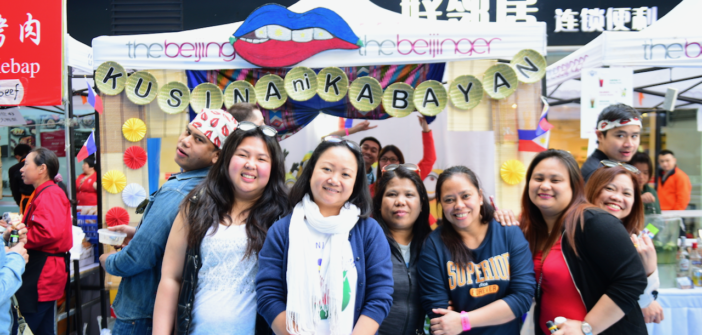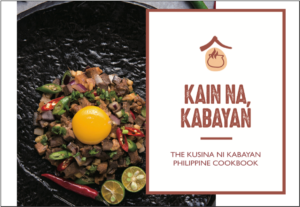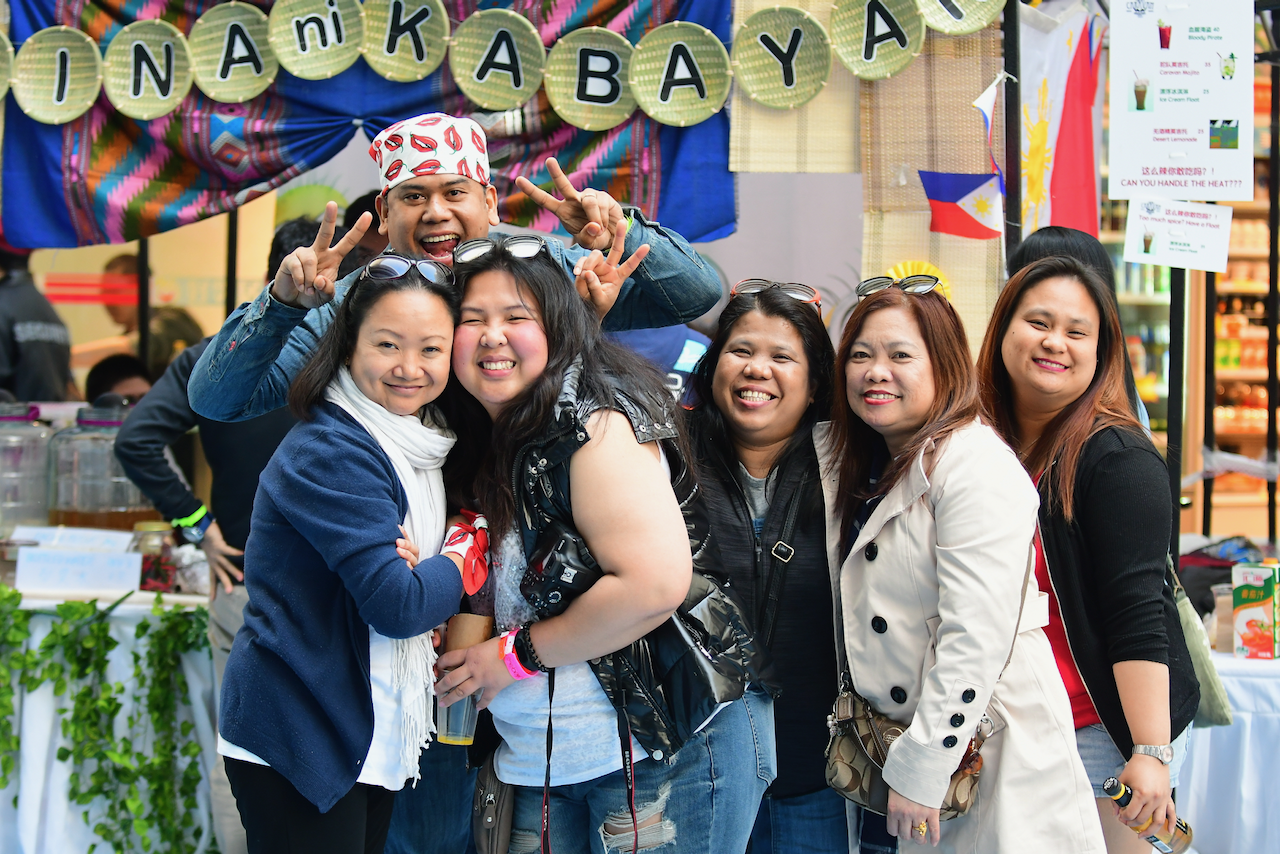When a popular magazine brand organized an international food fair in Beijing in April 2018, one community of enterprising Filipino expats took the chance to promote their cuisine.
Kusina ni Kabayan (KnK, “Our Compatriot’s Kitchen” in English) represented the Philippines at the two-day Hot & Spicy Festival, facing heavyweights and newcomers in Beijing’s food and beverage industry. But what impressed attendees and customers was that KnK wasn’t even a restaurant; it was a WeChat group of Filipinos, longing for their native food.
It was this same desire that inspired Perlita Pengson to establish the group in late 2017.
In her 30 years of living in Beijing, Perlita has seen some Philippine food ventures that, despite a strong following in the community, did not take off.
“One of those ventures was a bakery, which closed down after its owner retired and went home,” Perlita explains. “Another restaurant opened in 2010, but one of its owners also went back to the Philippines. Although there are Filipino chefs working in the city, none of them have tried establishing a Philippine restaurant.”
Beijing’s thriving market has become a breeding ground for innovative companies and people, but sky-high costs are a detriment to small and medium enterprises. For restaurants, in particular, finding a good location is key to reaching customers, but staying there is a question of how and when: how to pay for the exorbitant rental fees and preparing for when local authorities decide to close an area for renovation or construction of public infrastructure.
Despite this, many food chains have found their ways to satisfy the adventurous palates of Chinese customers. Go to the expat hotspot of Sanlitun or to the shopping district of Xidan and you’ll find outlets that sell Thai or Vietnamese food. Stroll around the malls around the city and you’ll see an abundance of Japanese or Korean restaurants. But you have to get to know a Filipino in the city or be invited to a function at the Philippine Embassy to taste the wonders of this cuisine.
And of course, through the internet, Philippine food has become accessible to almost everyone in China. On the shopping app Taobao, for example, there are Philippine snacks or ingredients ready for shipping. Enterprising Filipinos have turned this into an opportunity to recreate their delicacies.
“There are Filipino chefs who are making homemade food,” Perlita says, “So when I crave for native delicacies, I contact some of them on WeChat and ask if they can cook an extra bowl for me. I even ask some of them if they sell their products because I am always ready to buy them!”
Perlita initially gathered her chef friends and cooks into a WeChat group for a reason: to share photos of their homemade food and share it with others who have the same longing for Philippine food. Soon after, Kusina ni Kabayan was born.
Since its beginnings in late 2017, KnK has transitioned from being a small online community dedicated to marketing home cooks and their products into a thriving volunteer-run group that promotes Philippine cuisine and culture.

“I realized that the Hot & Spicy Festival was the right opportunity for us,” Perlita says. “Prior to signing up for the event, I made sure that the members and volunteers knew the purpose of the group: to support Filipinos with small food businesses and help them promote their products.”
As the group prepared the Filipino stall for that festival, many Filipino expat talents reached out to Perlita. Many of them told her they were looking for a way to be involved in the community.
“My first time of volunteering was during KnK’s Krismas sa Pinas Christmas event in 2018, when my mother-in-law was here in Beijing to look after my daughter,” cookbook contributor Rona Kulkarni shares. “My husband was very supportive of me and even he enjoyed helping the group during events.”
“I was looking for a Filipino community group in Beijing, and so I was delighted to meet KnK at the festival,” cookbook Creative Director Celson Durante says. “I even told Ms. Perlita that I could help lift tables and boxes but eventually I became part of the team that designs the promotional materials of KnK.”
Since the group’s blazing debut in April 2018, KnK has sustained the impetus by organizing its own events for the community. In September 2018, KnK held the Pamilyang Pinoy Autumn Family Food Fair at the Pingguo Community Space in Shuangjing, where small-time entrepreneurs sold their home-cooked delicacies. Other volunteers organized palaro (native games) and an arts-and-crafts session on the sidelines of the fair.
The group also brought the Filipino Christmas tradition to the expat community in Beijing. In the Krismas sa Pinas Philippine-Style Christmas Bazaar in December 2018, KnK once more invited Filipino entrepreneurs to sell their food products and Christmas delicacies to hundreds of expats and local customers from the Chinese capital and nearby cities. This Philippine bazaar fared well considering major holiday parties and winter fairs such as the popular German Christmas bazaar were also held on the same date.
From its launch until the spring of 2019, KnK worked on coming up with a grander event in celebration of the 121st anniversary of Philippine independence. The big idea resulted in Piyesta Kultura 2019, which took place at the Pan Pacific Beijing Hotel in Xidan and featured a Filipino food bazaar and a cultural extravaganza including a beauty pageant and a karaoke sing-off that highlighted the festive colors of the Philippine culture.
KnK members built on the success of Piyesta Kultura and created a spin-off of Miss KnK for children, Little Mr. & Ms. KnK 2019 in August 2019 at The Bookworm in Sanlitun. Six children from mixed Filipino families showed off their talents and wit while a food fair was being held on the side.
After all these successful events, KnK has now moved into another territory: publishing the Kain na, Kabayan cookbook with recipes from its member home cooks. The volunteers who participated in the creation of this cookbook were eager to show people the Filipino bayanihan or community spirit.
“When I make my dishes, I ensure I do it from the heart,” contributor Jose Marie Garcia says. “And that’s what I have shown during my volunteer work at KnK events. Even before a planning meeting is finished, I am already thinking of how to make the event the best our community has done. And I always make sure that I enjoy every moment of my volunteer work with KnK.”
“I feel so stoked because I will be able to share my ideas in cooking Philippine food,” contributor Jennifer Corcoro says. “KnK has helped people like me to express our talents. And this cookbook is a testament to that.”
US-based Filipino educator Rommel Penullar, who used to work for an international kindergarten in Beijing, contributed his recipes for the cookbook. He is one of the ardent volunteers of KnK, present in every major event since the group’s inception.
“I’m sure that our readers will be able to relate to the cooks whose profiles are featured in the cookbook,” he said. “KnK has a huge potential to become a bigger community not only in Beijing but also outside of China. There are Filipinos who are coming to China and are looking for a connection—and this is what KnK does best: connecting people through events and giving them a sense of belonging.”
To find out more about ordering Filipino food, or helping Kusina ni Kabayan grow their community group through sponsorships or donations, add Perlita on WeChat at PerlitaPengson1.

This article first appeared in the Kain na, Kabayan: The Kusina ni Kabayan Philippine Cookbook.
Email kusinanikabayan@gmail.com to get your copy.
Photos: JR Torres, Kusina ni Kabayan

how to participate? working right now in Beijing.
Hello, Marivic! There’s a WeChat group for this. If you may, I can contact you via email. Thanks!
how to participate? working right now in Beijing